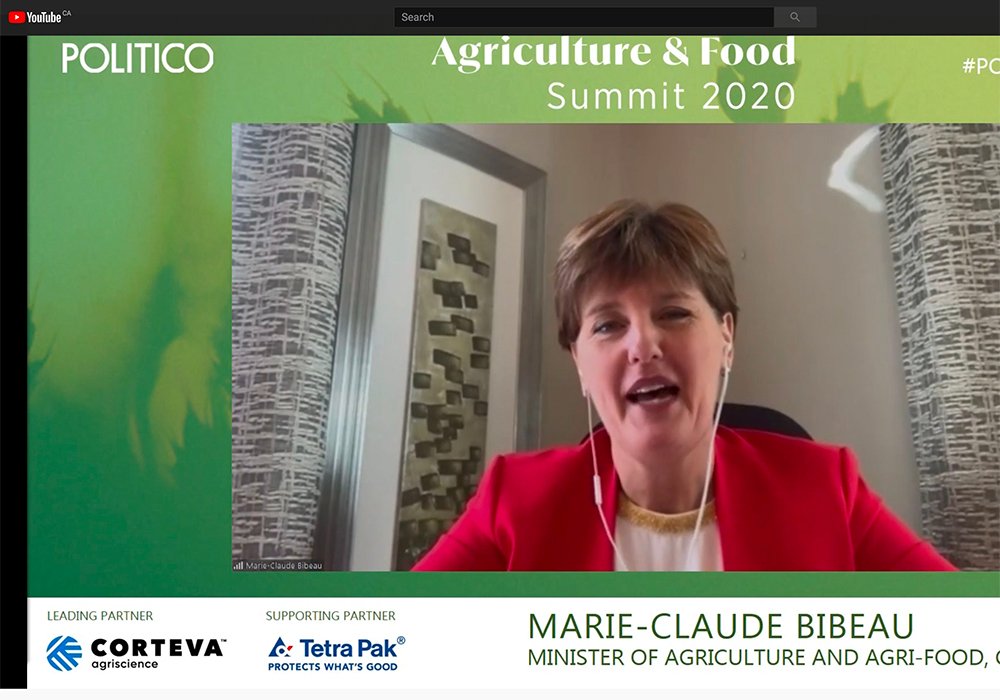Glacier FarmMedia – Federal Minister of Agriculture and Agri-Food Marie-Claude Bibeau says industry and government have a shared responsibility to fix a trade deal that hasn’t brought strong results for Canadian producers.
Expected to generate $1.5 billion in new agri-food exports, the Comprehensive Economic and Trade Agreement (CETA) with the European Union has fallen short of those targets since being implemented in 2017.
Why it matters: The EU gained access to new Canadian markets through CETA but Canada hasn’t realized its expected export gains from the deal.
Read Also

Ontario’s agri-food sector sets sights on future with Agri-Food 2050 initiative
The first-ever Agri Food 2050, a one-day industry event dedicated to envisioning the future of food and farming in Ontario,…
During a Sept. 25 virtual appearance at Politico’s Agriculture and Food Summit, Bibeau said she would like Canada to benefit from CETA “which is not the case yet.”
In an Oct. 1 interview, Bibeau said the event, which brought together power players from across the European continent “was an occasion to remind our European colleagues that it’s important to look at the high quality of Canadian producers and the fact we have a very robust inspection system that they can trust our way of doing things.”
Member states of the EU have imposed trade barriers on Canadian products, including pork, beef, canola, sugar and grains. Non-trade tariff barriers, like labelling requirements, have prevented the uptick in exports expected when the deal was signed.
“It’s important to remind (Europeans) as well how (the) Canadian agriculture sector is based on family farms and that our farmers care for their land, their environment, their animals,” said Bibeau. “Sometimes (Europeans) tend to believe that we are all big corporations, we don’t care about the environment — and it’s not based on anything, so I think it’s important to reassure them and remind them that they can definitely trust our producers, and it’s important that they open their doors as expected.”
Her comments to the European audience were made days after a group of former premiers argued in a letter to Prime Minister Justin Trudeau that CETA has “failed to deliver on its promises for Canada’s agri-food exporters.”
Asked how to improve the agreement, Bibeau said it was a “shared responsibility” between government and industry.
“It’s the responsibility of the government to make sure the producers are safe, that they respect the rules and that trade is based on rules and science,” she said.
“On the other side, industry has to acknowledge that consumer preferences are changing and they have to acknowledge that and get ready for this new demand.”
Bibeau noted non-tariff trade barriers shouldn’t be used, but at the end of the day it is “customers and consumers who make the last decision.”
The minister confirmed supply-managed dairy farmers will receive a second round of compensation for trade deals by the end of the year. Promised several times, including in the recent Throne Speech, dairy farmers continue to wait for full compensation resulting from CETA and the Comprehensive and Progressive Trans-Pacific Partnership (CPTPP).
Those deals opened up 3.25 per cent of the overall dairy market to international competition, with the new NAFTA deal increasing that to 8.4 per cent.
Poultry and egg farmers also continue to wait for compensation from those trade deals, but are expected to know the amount they will receive by the end of the year.
Meanwhile, the federal government is delaying its commitment to compensate supply-managed industries for negotiating away market share from the Canada-United States-Mexico Agreement (CUSMA).
“We’re giving ourselves a bit more time,” said Bibeau. “We’re putting so much energy into the emergency measures related to COVID. Still, we acknowledge that we made commitments for these compensations. The overall Canadian economy is benefitting from these agreements, but our supply-managed farmers and processors had to make sacrifices and we owe them these compensations.”















